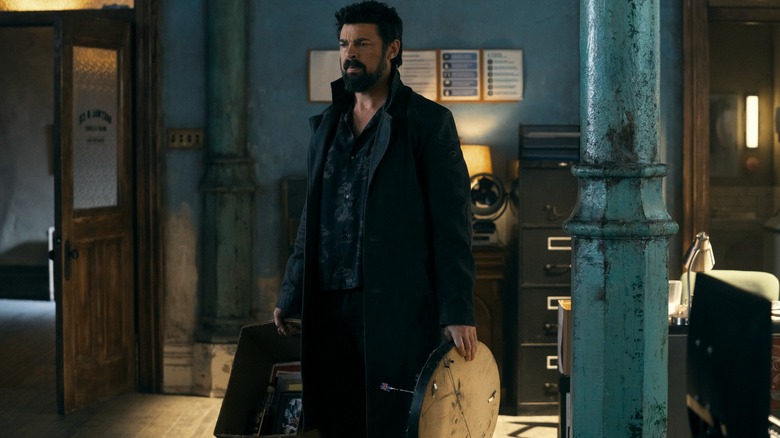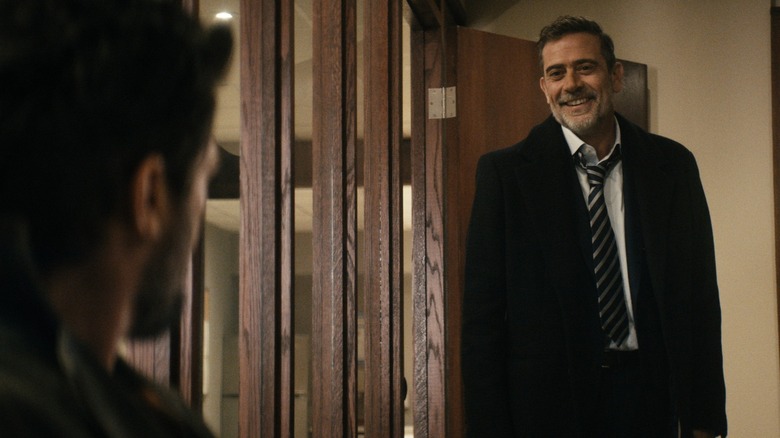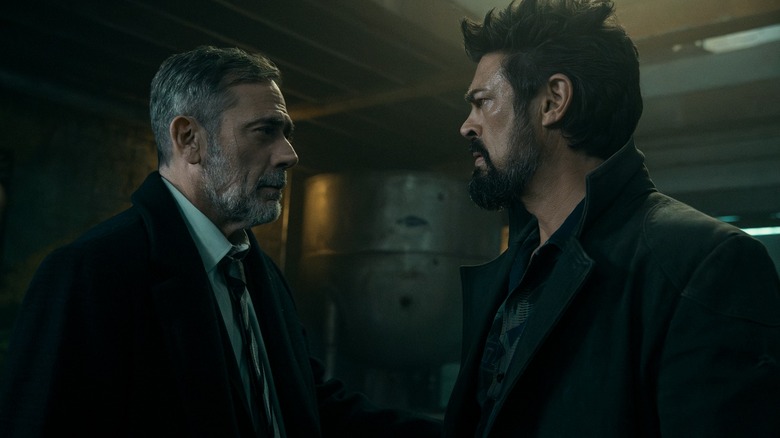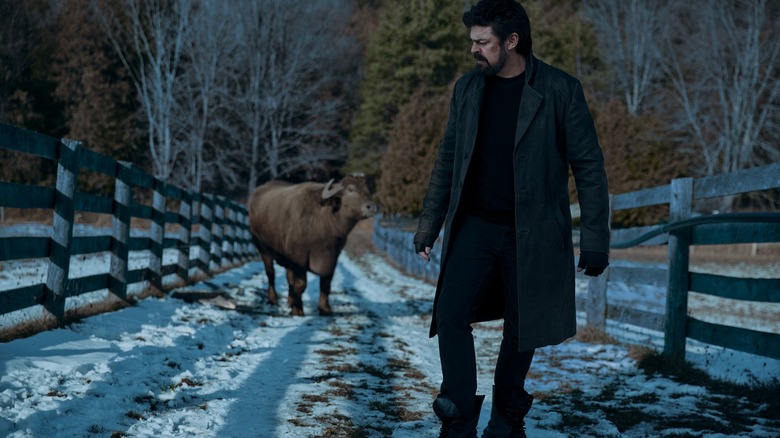Every Clue Leading Up To The Most Shocking Reveal In The Boys Season 4
This post contains spoilers for "The Boys."
In "The Boys," Billy Butcher (Karl Urban) has always been hounded by his own demons. After losing his wife Becca (Shantel VanSanten), Butcher trampled on his vulnerabilities to wield brutality as a weapon, and this worked in his favor several times, giving the titular group the advantage they needed. However, beneath this devil-may-care unpredictability lies layers of emotional baggage: unresolved childhood trauma revolving around Lenny's death and the constant clash between morality and purpose that defines his arc. By the end of Season 3, Butcher was reduced to a shell of a man — a predicament made worse by the unchecked use of Temp V, which contributed to a tumor consuming his psyche. In the latest season, Butcher has oscillated between opposing impulses, giving into a gentler, more compassionate side while retaining his signature brutality, unleashing it when one least expects it.
I talked at length about the ghosts of the past haunting Butcher this season, with Becca's apparition nudging him firmly towards the light, leading him to curb his extreme impulses on more than one occasion. We see this play out when Butcher decides not to betray Hughie (Jack Quaid) by handing over incriminating files to Victoria Neuman (Claudia Doumit), and when he chooses to talk to Ryan (Cameron Crovetti) instead of drugging and containing him in a facility. However, one person constantly eggs Butcher on to commit the worst atrocities, urging him to give in to his morally void impulses without regard for consequence.
War veteran and CIA case officer Joe Kessler (Jeffrey Dean Morgan) feels like a demon perched on Butcher's shoulder, whispering the most reprehensible schemes possible at any given moment. That's because he is, quite literally, a culmination of Butcher's bleakest, most violent impulses flaring up before death.
Joe Kessler never interacts with anyone except Butcher
Butcher meets Kessler at the CIA Headquarters after Grace Mallory (Laila Robins) prevents him from interacting with President-elect Robert Singer (Jim Beaver), prompting MM (Laz Alonso) to take over. This is also the moment when MM assumes leadership of The Boys, as he deems Butcher too unpredictable, especially after the latter comes clean about his terminal illness. Just when Butcher is loitering alone in the halls while feeling robbed of purpose, Kessler crops up, like a deus-ex-machina in the form of a long-lost friend who has returned to team up with the now-disenfranchised Butcher. The two chat about how they go far back, expressing fondness for each other while establishing an emotional baseline for near-future cooperation.
Right off the bat, there are some glaring inconsistencies to look out for. Although The Boys have been collaborating with the CIA for quite some time, no other operative ever mentions Kessler, not even Mallory, who is close to Butcher despite the two sharing a somewhat contentious relationship. During the reunion scene, no one else bumps into Kessler or acknowledges him — if we are to take Kessler's credentials at face value, his return to the CIA would be considered a big deal in their plans to thwart Vought and by extension, Homelander. This pattern continues whenever Kessler shares a scene with Butcher, as the two only converse with one another without being perceived by a third party.
After last episode's horrifying ordeal at Stan Edgar's (Giancarlo Esposito) farmhouse, Butcher and Kessler kidnap Sameer (Omid Abtahi) after amputating him and speak in the prisoner's presence. This exception only heightens our doubts, as Sameer does not acknowledge Kessler at all, but answers to Butcher alone, as if he is the only other person in the room.
Kessler has always felt like a ghost of a character in The Boys
Kessler has been a lingering presence since the first episode of the latest season, and despite being fleshed out in vivid ways, he has always felt liminal, like a ghost following Butcher. Our understanding of Kessler is solely defined through Butcher's lens of experience, and every character facet we've learned so far has felt incomplete. Compiling everything we know, the truth revealed in episode 6 does not feel as strange as it should: Joe Kessler is a figment of Butcher's fractured psyche, a condensed representation of his most amoral compulsions, as opposed to Becca, who is a stand-in for his conscience, and the man he could have been.
The real Kessler has been dead for years and was abandoned by Butcher no less, as he had left him to die despite sharing a close friendship with him. Every time Kessler expressed warmth for Butcher during his hallucinations, it was a gross inversion of the truth to assuage guilt over the wrongdoings of his violent and turbulent past: a haphazard illusion of comfort cooked up by a mind clawing for self-preservation. After Butcher is forced to face the truth, he realizes that every extreme proposition put forward by Kessler stems from his own heart: the callous indifference towards others, the sudden, violent misogyny, and even the urge to wipe out every Supe to appease his twisted sense of retribution.
It remains to be seen whether Butcher will let Kessler in by accepting these horrible parts of himself, or banish him altogether while he's still in control of his mental faculties. The light surrounding Becca's desperate pleas for Butcher's salvation seems to be dimming with time, paving an unforgivably dark path that will only end in tragic catastrophe.
Stray breadcrumbs that lead up to the Kessler reveal
-
Conversations about Temp V reveal the existence of an unknown parasite manifesting inside anyone injected with the drug over a long time. This is exemplified when Butcher saves an infected rabbit at Edgar's farm, but the parasites inside it burst out and kill the host. The violence inherent within the parasite could explain Joe's extremist tendencies, manifesting in physical and psychological ways inside the brain of a tormented human. This would also explain how Butcher was able to tear a Supe apart without having any conscious recollection of doing so.
-
When Butcher and Kessler come up with a plan to drug Ryan, the latter supplies him with carfentanil, but the bag containing the drug is already present on Butcher's kitchen slab before Kessler walks up to him. Ryan's arrival leads to Kessler's abrupt departure, and the man magically re-appears soon after the child leaves, as if he had never left.
-
Apart from only speaking to Butcher after being kidnapped, Sameer looks visibly distressed and confused when Butcher says "We'll patch you up," proving that he was alone with Sameer.
-
When Kessler describes The Boys during a conversation on the park bench, his descriptions feel too personalized and derogatory, resembling Butcher's perception of them over the years. Kessler does not know these people at all, but hones in on specific traits that reduce them to their inherent or perceived flaws. He reduces MM to his anxiety, Hughie to his inability to act without conviction, and Frenchie to his tendency to resort to drugs. Kessler also shares a disdain for Starlight just like Butcher does (despite having no reason for this sentiment) and views Kimiko as a weapon, as opposed to a person deserving of respect in their own right.



